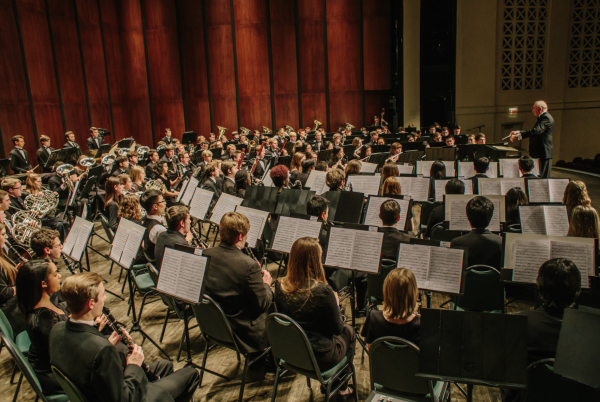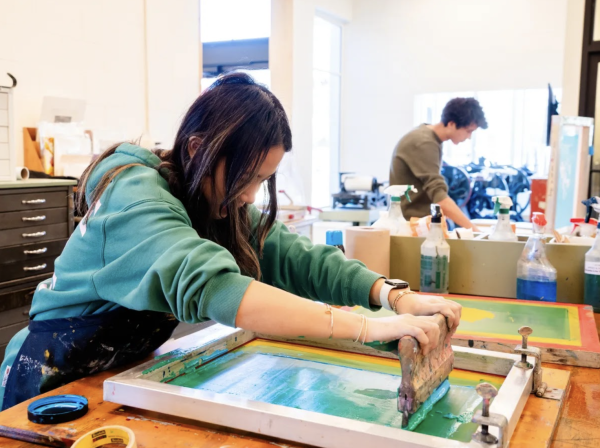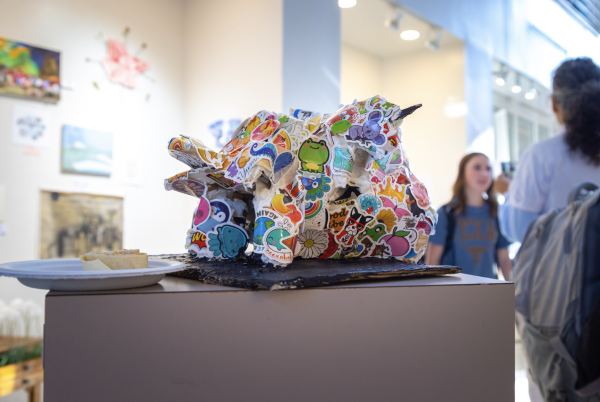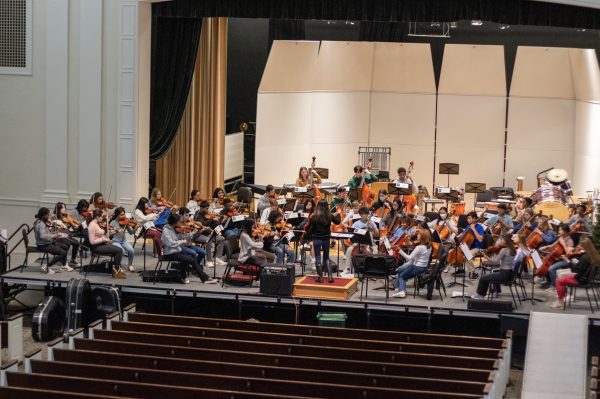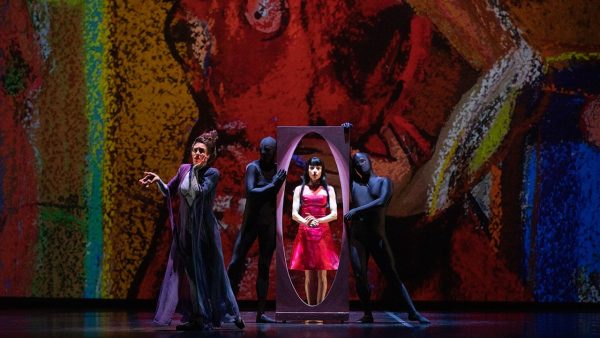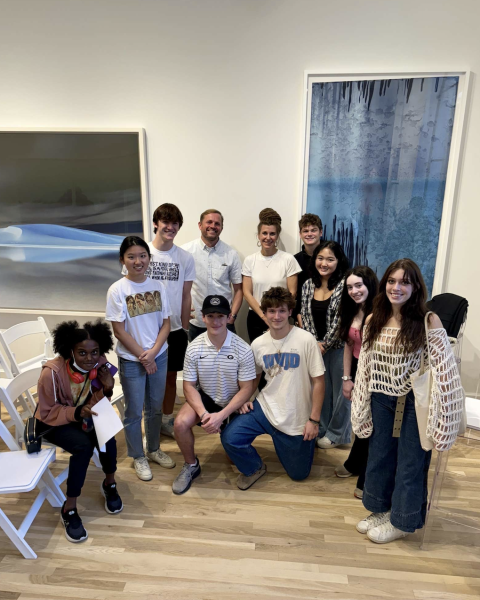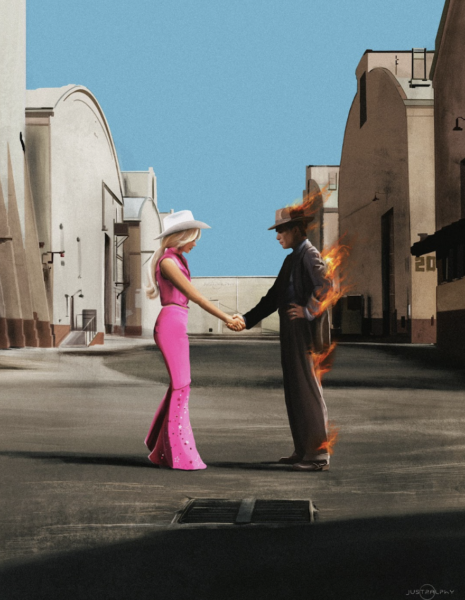Orchestra meets famous violinist Joshua Bell
Westminster’s Chamber Orchestra had a rare opportunity to meet the world-class violinist Joshua Bell on Sept. 15. The class attended a rehearsal of the Atlanta Symphony Orchestra’s season opening concert featuring Bell as the soloist and three works by Russian composer Pyotr Ilyich Tchaikovsky, including the famous Violin Concerto in D Major. After the rehearsal, Bell met with the students for a meet-the-artist segment, where he answered their questions and gave them advice. Upper School instrumental music director Scott Stewart had been arranging the visit with Bell’s agent and the Atlanta Symphony Orchestra for nearly a year.
“As a part of our vision at Westminster, we want our students to be surrounded by the world’s best performers, composers, musicians of every type,” said Stewart. “Josh Bell fits that category, and so it felt appropriate to initiate that conversation so that it could become a reality.”
Stewart and Bell studied at Indiana University together, and their friendship made the opportunity to see Bell rehearse especially significant for Stewart.
“When you’re with him, you forget that he’s one of the top performing violinists in the history of violin performance,” Stewart said. “When he’s playing, it’s an elevating experience; it’s a spiritual experience. He is so technically virtuosic that it seems to transcend what most humans would be able to do, but he’s also so expressive.”
Many of the students had only recently heard of Bell, like senior Myles Hudson. Hudson, a cellist, discovered that watching another musician play deepened his own understanding of musical expression.
“He was performing, not just playing,” Hudson said. “Transforming the actual notes themselves into beautiful music was something that Josh Bell did very well and very effortlessly. That’s definitely something I could put into my own playing.”
For senior Christine Liu, the Atlanta Symphony Orchestra set a prime example of the importance of communication and connection within an orchestra.
“The soloist was really in touch with the conductor and the orchestra as a whole; he would at times conduct the orchestra with his violin,” Liu said. “It also shows that when you’re playing in an orchestra without a soloist, you have to be really engaged with the conductor and with each other.”
During the meet-the-artist session, Bell spoke about how he has learned to practice with efficiency, making the most out of only 30 minutes of practice time. Bell performs in approximately 140 concerts per year, many of which take place in various different countries, so finding practice time presents a challenge. This advice resonated particularly with the Chamber Orchestra students. While they may not be constantly performing from country to country, packed schedules can leave little time for practicing.
“We’re so busy with all the schoolwork and sports and everything, that it’s hard to find time to practice,” Liu said. “So hearing an international superstar like Joshua Bell talk about how he squeezes in practice time even with his busy travelling schedule was really nice.”
Bell also described how he makes music come alive. By telling a story through his violin, Bell performs a concerto as an actor performs a play. Linda Cherniavsky, the Upper School orchestra director, teaches her students to tell a comprehensive story of an instrumental piece by learning the background of the composer and the piece itself.
“I think we can deepen our experience in the Chamber Orchestra class by perhaps studying in a different way,” said Cherniavsky. “What was going on when the composer wrote this piece? What was the occasion for which this piece was written? What meaning does that have?”
She asked her class these questions in preparation for their performance on Oct 13 of two pieces from the film Henry V, a 1944 adaptation of Shakespeare’s play, composed by William Walton. Stewart and Cherniavsky chose these pieces to honor the 400th anniversary of Shakespeare’s death. Henry V is only an introduction to Shakespeare for the Chamber Orchestra. After their October concert, they will have another performance on Nov. 8 at the Carlos Museum of Emory University for the First Folio exhibit about the first collection of Shakespeare’s plays.
In addition to the pieces from Henry V, the orchestra performed Michael Daugherty’s Strut and Felix Mendelssohn’s Sinfonia for the fall concert.
“The Mendelssohn can help the orchestra develop better classical styles and an interplay of lines, which is one of the characteristics of Mendelssohn’s writing,” said Cherniavsky.
The third work, Strut, retells the history of the Harlem Renaissance and Paul Robeson, a singer, actor, and outspoken black rights activist. Strut derives its name from the image of a drum major strutting down a street in Harlem, leading a procession of people. The piece incorporates techniques that create more percussive, rhythmic sounds rather than flowing melodies.
“We wanted to do something with a more contemporary energy and punch, a maybe more aggressive style, and that’s what we chose with Michael Daugherty,” said Stewart.
Daugherty often bases his music off of American icons, such as Robeson. Robeson, a prominent figure in the movement for racial equality, represents more than just a drum major at the head of a parade.
“It’s symbolic of what was happening with music and art in the Harlem Renaissance, that they were leading a civil rights movement out of really difficult times for African Americans,” said Stewart. “That can also open a conversation, which is also appropriate in schools, about the connections between music and other disciplines.”
World-class professionals like Bell and music students alike understand this concept of expressing a meaningful narrative through sound, the ability of music to embody something more than what’s on the surface. The real challenge is communicating this to an audience.
“I will say that a lot of Westminster kids don’t show up to our concerts, but if they did show up, something they would probably take away from is how beautiful orchestral music can be,” said Hudson. “A lot of people are used to vocal music, like pop and rock, and orchestra music can be just as beautiful, but in a different kind of way. It can be very evocative; it changes your emotions.”
Something so powerful to the human experience is best enjoyed together, and concerts provide a way for people, musician or not, to share that experience.
“I think that in our lives today, we’re so focused on getting all of our things together that we sometimes don’t take time to go to the play, or to go to the symphony concert,” Cherniavsky said. “It’s important to learn how to come together as a group and experience things as a collective.”
